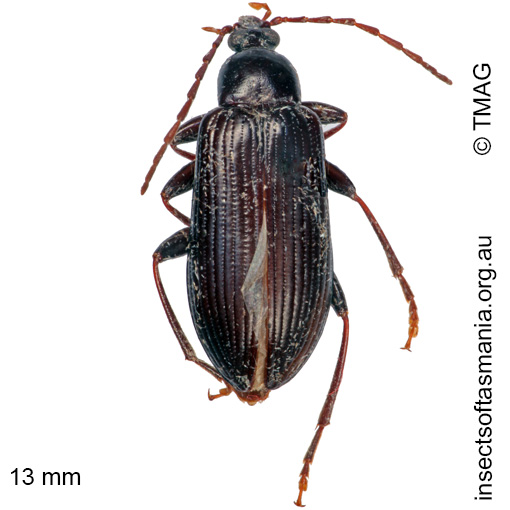
Dimorphochilus luctuosus (a species of darkling-beetle)
Basis for Tasmanian occurrence
Semmens, T.D., McQuillan, P.B. & Hayhurst, G. (1992). Catalogue of the Insects of Tasmania. Government of Tasmania: Department of Primary Industry, 104 pp.(as Homotrysis luctuosa)
TMAG collections
Classification
Order: Coleoptera
Suborder: Polyphaga
Superfamily: Tenebrionoidea
Family: Tenebrionidae
Subfamily: Alleculinae
Tribe: Alleculini
Morphology
Typical length (mm): 13
Flightedness: winged and assumed capable of flight
Flightedness: winged and assumed capable of flight
Source literature on morphology and taxonomy (*primary taxonomic source, where identified):
Carter, H.J. (1915). Revision of the Australian Cistelidae, Order Coleoptera. Proc. Roy. Soc. Vic. 28: 52-104.
Ecology
Assumed larval feeding: (not yet documented)
Association with dead wood or old trees: (not yet documented)
Ecological attributes: — Found under large logs (Grove et al., 2006).
Collection method(s) for TMAG material: — At light (with use of light-trap) — Hand collection (substrate not specified) — Hand collection from Olearia lirata — Hand collection from under log of Eucalyptus sp. — Pitfall trapping.
Association with dead wood or old trees: (not yet documented)
Ecological attributes: — Found under large logs (Grove et al., 2006).
Collection method(s) for TMAG material: — At light (with use of light-trap) — Hand collection (substrate not specified) — Hand collection from Olearia lirata — Hand collection from under log of Eucalyptus sp. — Pitfall trapping.
Source ecological literature:
Grove, S.J. et al. (2006). What lives under large logs in Tasmanian eucalypt forest? Tas. Nat. 128: 86-93.

